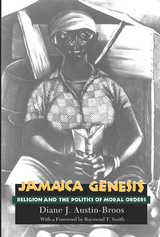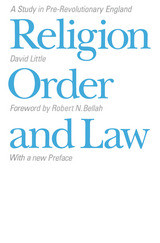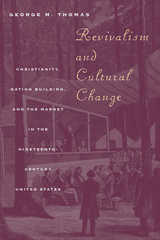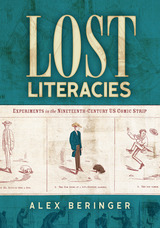6 books about Sociology, Christian

The Heavenly Contract
Ideology and Organization in Pre-Revolutionary Puritanism
David Zaret
University of Chicago Press, 1985
The idea of a heavenly contract, uniting God and humanity in a bargain of salvation, emerged as the keystone of Puritan theology in early modern England. Yet this concept, with its connotations of exchange and reciprocity, runs counter to other tenets of Calvinism, such as predestination, that were also central to Puritan thought. With bold analytic intelligence, David Zaret explores this puzzling conflict between covenant theology and pure Calvinism. In the process he demonstrates that popular beliefs and activities had tremendous influence on Puritan religion.
[more]

Jamaica Genesis
Religion and the Politics of Moral Orders
Diane J. Austin-Broos
University of Chicago Press, 1997
How has Pentecostalism, a decidedly American form of Christian revivalism, managed to achieve such phenomenal religious ascendancy in a former British colony among people of predominately African descent? According to Diane J. Austin-Broos, Pentecostalism has flourished because it successfully mediates between two historically central yet often oppositional themes in Jamaican religious life—the characteristically African striving for personal freedom and happiness, and the Protestant struggle for atonement and salvation through rigorous ethical piety. With its emphasis on the individual experience of grace and on the ritual efficacy of spiritual healing, and with its vibrantly expressive worship, Jamaican Pentecostalism has become a powerful and compelling vehicle for the negotiation of such fundamental issues as gender, sexuality, race, and class. Jamaica Genesis is a work of signal importance to all those concerned not simply with Caribbean studies but with the ongoing transformation of religion andculture.
[more]

A Nation of Behavers
Martin E. Marty
University of Chicago Press, 1980
"National Book Award-winning author and historian Martin E. Marty's A Nation of Behavers is a characteristically perceptive new map of American religion. . . . Marty's years of astute observation of America's religious trends and developments have yielded six informal but clearly defined clusters around which people attempt to find not only basic group identity but also some kind of power. Anyone concerned about belief and its manifestations will be immensely aided by Marty's cogent comments on recent religious happenings."—Commonweal
"This is a book for everyone, more than for the scholar of American religion. . . . Its value is in breadth of vision and new interpretation."—Dean R. Hoge, Theology Today
"As a means of making sense out of the potpourri of competing groups that compose religious America today, A Nation of Behavers is a first-rate tool."—Edward A. Fiske, New York Times
"This is a book for everyone, more than for the scholar of American religion. . . . Its value is in breadth of vision and new interpretation."—Dean R. Hoge, Theology Today
"As a means of making sense out of the potpourri of competing groups that compose religious America today, A Nation of Behavers is a first-rate tool."—Edward A. Fiske, New York Times
[more]

Religion, Order, and Law
David Little
University of Chicago Press, 1984
"The issue of the Protestant ethic and the spirit of capitalism has been debated endlessly, but few scholars have seriously continued Weber's own research into the Reformation sources of seventeenth-century England. David Little's study was one of the first to do so, and remains an important contribution."—Guenther Roth, University of Washington
[more]

Revivalism and Cultural Change
Christianity, Nation Building, and the Market in the Nineteenth-Century United States
George M. Thomas
University of Chicago Press, 1989
The history of Christianity in America has been marked by recurring periods of religious revivals or awakenings. In this book, George M. Thomas addresses the economic and political context of evangelical revivalism and its historical linkages with economic expansion and Republicanism in the nineteenth century. Thomas argues that large-scale change results in social movements that articulate new organizations and definitions of individual, society, authority, and cosmos. Drawing on religious newspapers, party policies and agendas, and quantitative analyses of voting patterns and census data, he claims that revivalism in this period framed the rules and identities of the expanding market economy and the national policy.
"Subtle and complex. . . . Fascinating."—Randolph Roth, Pennsylvania History
"[Revivalism and Cultural Change] should be read with interest by those interested in religious movements as well as the connections among religion, economics, and politics."—Charles L. Harper, Contemporary Sociology
"Readers old and new stand to gain much from Thomas's sophisticated study of the macrosociology of religion in the United States during the nineteenth century. . . . He has given the sociology of religion its best quantitative study of revivalism since the close of the 1970s."—Journal for the Scientific Study of Religion
"Subtle and complex. . . . Fascinating."—Randolph Roth, Pennsylvania History
"[Revivalism and Cultural Change] should be read with interest by those interested in religious movements as well as the connections among religion, economics, and politics."—Charles L. Harper, Contemporary Sociology
"Readers old and new stand to gain much from Thomas's sophisticated study of the macrosociology of religion in the United States during the nineteenth century. . . . He has given the sociology of religion its best quantitative study of revivalism since the close of the 1970s."—Journal for the Scientific Study of Religion
[more]

Sect Ideologies and Social Status
Gary Schwartz
University of Chicago Press, 1970
In this penetrating study of urban religion, Gary Schwartz examines the nature of the relationship between religious belief and the social order. He shows how a person's experience in the social hierarchy shapes his response to competing religious ideologies and, in turn, how commitment to a particular sect ideology colors his attitude toward mundane affairs.
The author studied and compared a Pentecostal group and a Seventh-day Adventist group in preparation for this work. The question which stimulated the investigation can be stated as a paradox. In the Adventist case, why should persons who firmly believe that God is soon to destroy the world work so diligently and against formidable odds to improve their own secular fortunes? In the Pentecostal case, why should persons who believe that God is available for direct aid in every human contingency not use this power for their own advancement?
In theorizing about the relationship between an individual's position in the socioeconomic system and his sect affiliation, Mr. Schwartz asserts that the specifically ideological component of a creed resides in the ways in which believers conceptualize the meaning of secular problems.
The study as a whole attempts to reveal what makes a special set of beliefs attractive to a person grappling with certain secular exigencies, and how these beliefs affect his view of secular matters. It develops a model of a religious ideology applicable to any study of the relationship between cultural symbols and social structure.
The author studied and compared a Pentecostal group and a Seventh-day Adventist group in preparation for this work. The question which stimulated the investigation can be stated as a paradox. In the Adventist case, why should persons who firmly believe that God is soon to destroy the world work so diligently and against formidable odds to improve their own secular fortunes? In the Pentecostal case, why should persons who believe that God is available for direct aid in every human contingency not use this power for their own advancement?
In theorizing about the relationship between an individual's position in the socioeconomic system and his sect affiliation, Mr. Schwartz asserts that the specifically ideological component of a creed resides in the ways in which believers conceptualize the meaning of secular problems.
The study as a whole attempts to reveal what makes a special set of beliefs attractive to a person grappling with certain secular exigencies, and how these beliefs affect his view of secular matters. It develops a model of a religious ideology applicable to any study of the relationship between cultural symbols and social structure.
[more]
READERS
Browse our collection.
PUBLISHERS
See BiblioVault's publisher services.
STUDENT SERVICES
Files for college accessibility offices.
UChicago Accessibility Resources
home | accessibility | search | about | contact us
BiblioVault ® 2001 - 2024
The University of Chicago Press









